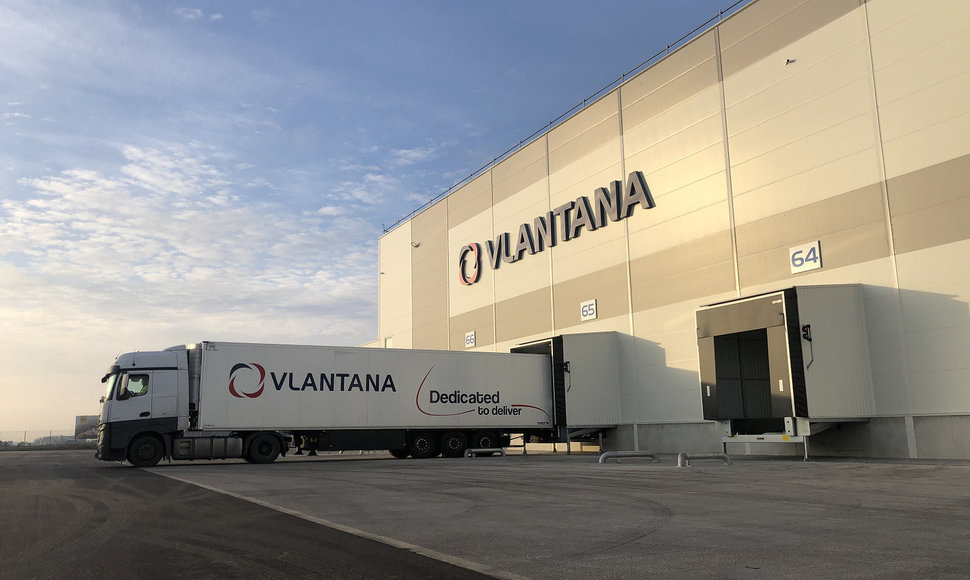The revelation caused a public outcry in social media and provoked strong reactions from famous politicians. But how do the carriers themselves view this situation? 15min spoke to Vladas Stončius, a shareholder of Vlantana, which is one of the biggest transport companies in Lithuania.
We have heard a lot during this past year about the exploitation of long-distance drivers in Central and Eastern Europe, including Lithuania. There are claims that drivers are being forced to pay illegal monetary charges and false fines made up by their employers, to fabricate their timesheets and break other rules. How would you respond to these allegations?
I am not indifferent to the problems of international haulage sector we have seen discussed in public domain and I strongly condemn any breaches of the rule of law. Speaking on behalf of my company, I can assure you that we comply with the highest business standards and principles, the EU and international legislation as well as the laws of Lithuania.
Talking about the transport sector as a whole, just like any other area it does have some issues which need to be resolved. However, I completely reject the allegation that the absolute majority of this business in peripheral Europe is involved in heavy violation of rules. Cargo haulage is a licenced activity and no self-respecting firm would ever risk losing their licence. We are constantly being checked and monitored by a vast number of state institutions – both in Lithuania and other European countries. Besides, our customers also perform planned and unscheduled audits on a regular basis. In addition, our activities are carried out in line with the ISO standards which means that our compliance to these standards is also audited all the time.
Conclusions of these audits provide factual evidence that any claims about driver exploitation in our company are unfounded.
You mentioned that no business would risk losing their licence. But in Norway one of the firms under your management have had their licence suspended.
The licence of Vlantana Norge was since reinstated by the Norwegian Public Roads Administration who acknowledged that there had been no grounds for suspending the licence and no cases of administrative misconduct had occurred, while conditions for high credibility had been fulfilled. This means that the firm can continue to legally operate in Norway. Having said that, the blow to the firm’s reputation was substantial because it could not continue its activities in Norway and was even forced to start the company liquidation process. Vlantana Norge is a separate legal unit so its withdrawal wouldn’t have had any impact on the activities of Vlantana in Lithuania.
And yet there is no smoke without fire. What could have prompted these allegations against transport companies?
Last year transport and logistics firms in Central and Eastern EU states were subjected to a mass disinformation attack on their business. Suddenly social media was awash with accusations of alleged mass-scale driver exploitation and some pretty absurd allegations of criminal activity. This smear campaign was only suppressed in July 2020 when the European Parliament gave its final approval to the Mobility Package which, frankly, discriminates the carriers of Lithuania and other peripheral countries. It is no secret that some of the requirements of the Package may be more favourable towards the business interests of the big Western European countries.
Hostility against the transport firms based in Eastern EU countries also came from Western trade unions which attempted to organise protests and strike action on behalf of drivers from third countries. We have an example of this kind of aggressive stance in Lithuania, too. The local trade union is known to initiate employment disputes en masse, demanding effectively the same things across all the different cases and coming up with the same arguments which are repeatedly being rejected by the courts as unfounded.
According to official statistics, less than 1% of employment disputes are deemed to have sufficient grounds, compared to the overall number of people employed by the transport sector of Lithuania.
Let’s go back to the testimonies uncovered by journalists, whereby drivers make direct claims of being exploited by their employers and stolen from. All of this is done openly, these drivers are not concealing their faces or true identities. It is hard to miss the logos of some of the large European transport companies, including yours, in these reports.
I can assure you that the practices of our company are lawful at all times and we always operate according to the contractual agreements we have committed to comply with. We would not be able to compete with other big companies otherwise as the shortage of drivers is felt across the entire European Union.
Only 0.1% of all salaries paid by the firm are cash operations and daily allowance payments. So over 99.9% of wages and daily allowances are processed via bank transfer. Any cash payments are made only in exceptional situations and only if an employee can provide a motivated request for such payment, e.g. if the driver does not have his bank card with him, or it may be lost/blocked, etc.
According to the drivers, many transport companies allegedly have special financial funds, consisting of monetary deductions from the drivers’ with the view of using this fund for compensating any potential damage in the future.
There are no such funds in any of our companies and no deductions are being made to compensate for potential future damage. Any losses related to potential damage or perishing of our trucks, cargo or any other property is the responsibility of the firm. We manage these risks through insurance contracts. Our fleet is protected by both the mandatory civil liability insurance and the voluntary KASKO insurance. This way we can fully manage the risks arising from any damage to the vehicles or their loss as well as any damage a driver could potentially cause to third parties or their property. The firm also has a civil liability cover as a carrier which takes care of any cargo-related risks.
What is your view on the working conditions in your firm?
Focusing on working conditions of our employees is our priority. All of our staff, including the drivers, are covered by insurance. This provides protection against all possible risks related to ensuring the health and well-being of our employees. The cover also includes re-patriation to the country of residence and to the address provided in case of illness or accidents.
Our company guarantees equal working conditions to Lithuanian drivers as well as those coming from other countries. We have a zero-tolerance policy on discrimination of other nationalities or other forms of exploitation.
In addition, the Mobility Package requirements are gradually coming into force and we are fully compliant with those. The workload of our drivers is being organised in line with EU regulations on driving and resting times. E.g. in line with the legal requirements of the European Community to ensure a weekly period of rest which is 45 hours or longer, Vlantana has provided its drivers with opportunities to take these breaks in accommodation rented by the company. These premises are available across Lithuania and other countries. If resting stops occur further away from Vlantana’s accommodation, an option to stay in a motel is also available.
According to official statistics, drivers working for carrier companies are much more likely to take unpaid leave when compared to employees in other sectors. Why is that?
Every employee of our firm is guaranteed their annual leave entitlement. The leave is given in full, paying the average working salary which is in line with Lithuania’s Labour Code. The specifics of long-distance driving means that drivers work based on a rotational principle, whereby after several weeks away on business, employees do not want to continue working without an opportunity to spend a couple of weeks at home or any other place chosen by the driver.
Unpaid leave is granted not at the will of the employer but to meet the requirements of the staff if the company wants to retain them. So unpaid leave brings no benefits to the employer whatsoever. In order to employ the fleet of exactly the same size, it is necessary to have a much bigger pool of drivers, of which there is a shortage already. Having returned from their business trips, drivers want to have some extra free time for getting back to their home countries or spending it with their families.
There are rumours that drivers are being transported to their places of work in mini-buses across the entire continent. Is this something your firm does, too?
Vlantana does not and has never organised for their drivers to be carried in buses. Our business model means that our drivers reach their place of work in Europe by driving trucks assigned to them from the firms’ Lithuanian base in Klaipėda. There is also an option to take a ferry from Klaipėda to the German port Kiel and drive from there.
In line with several regulations of the European Mobility Package, the same principle applies to our drivers travelling back to the base.
Carriers are also accused of forcing drivers to fabricate their timesheets.
We operate in a responsible and honest way and strictly condemn any kind of manipulation when it comes to recording working hours. The fleet of Vlantana consists of brand new trucks which meet the Euro 6 emissions standard. Every single vehicle owned by the company is equipped with a digital tachograph that tracks and stores information on all activities of the driver.
The workload of our drivers is being organised strictly in line with EU regulations on organising drivers’ workload as well as their work-rest regime.
It is important to note that the vehicles of cargo carriers and the tachographs fitted inside them are constantly being checked across Europe by road traffic officials. This is why not only are any violations of law absolutely not tolerated within Vlantana but this kind of operating would be totally impossible due to external impact.













